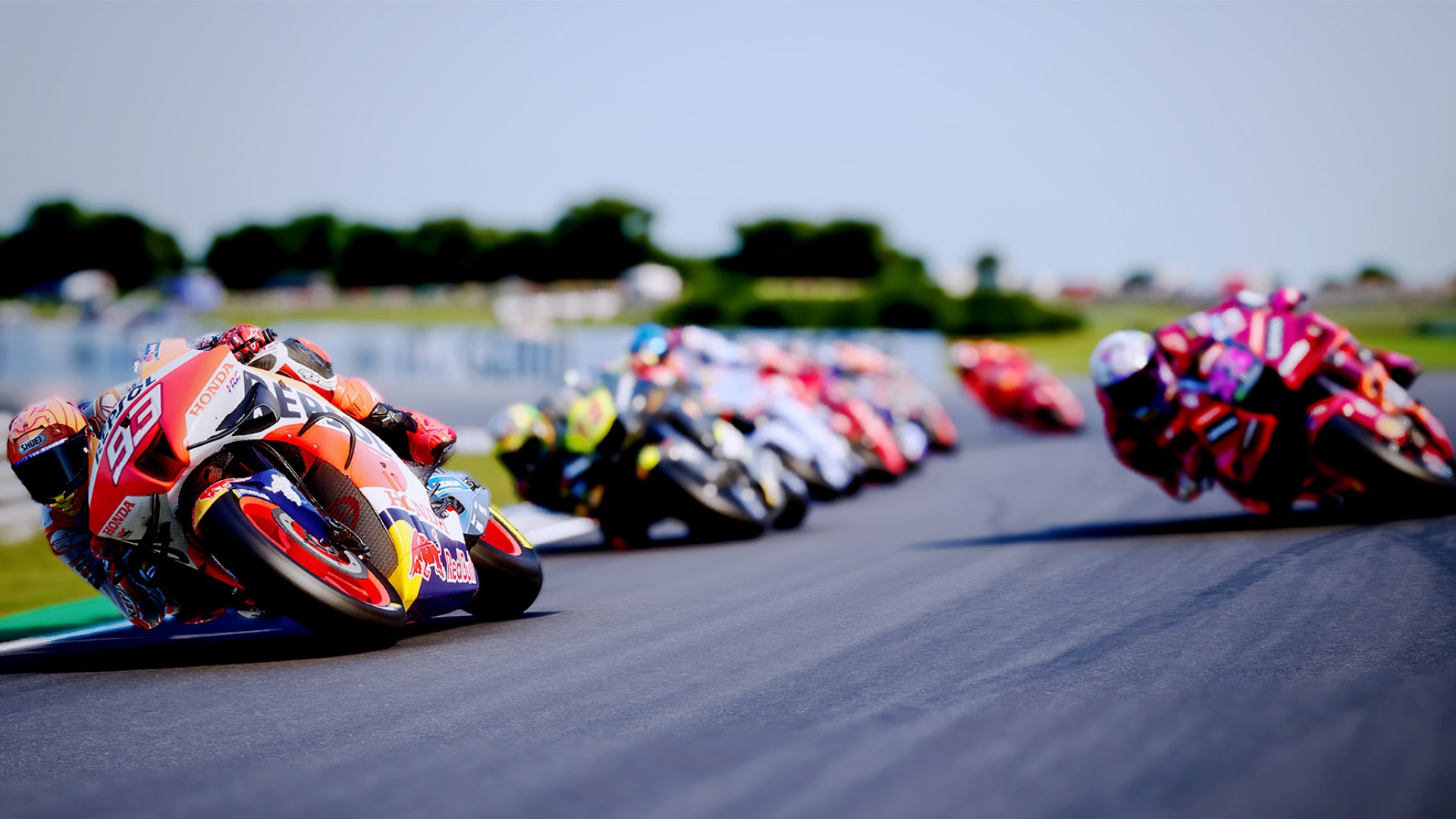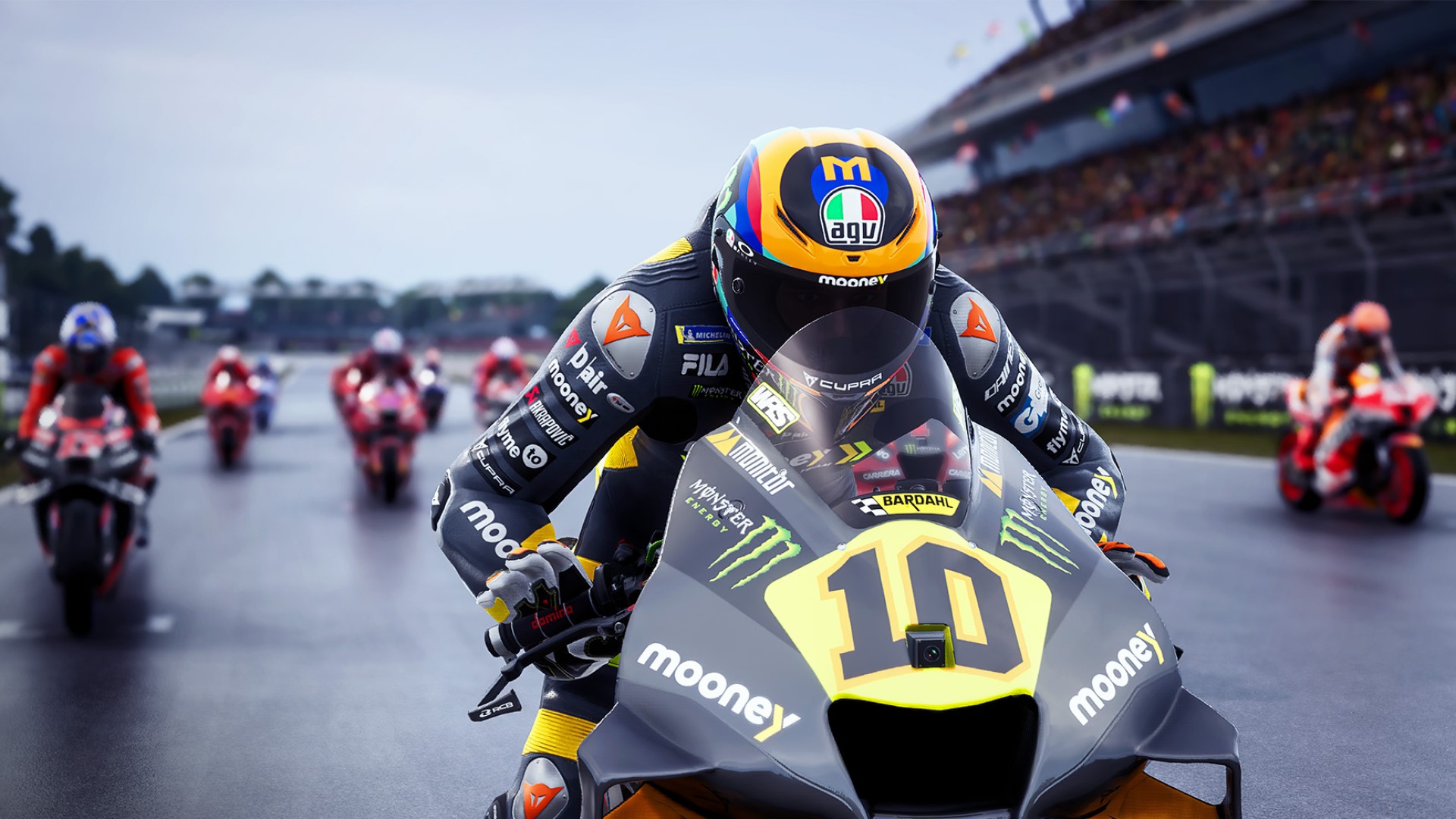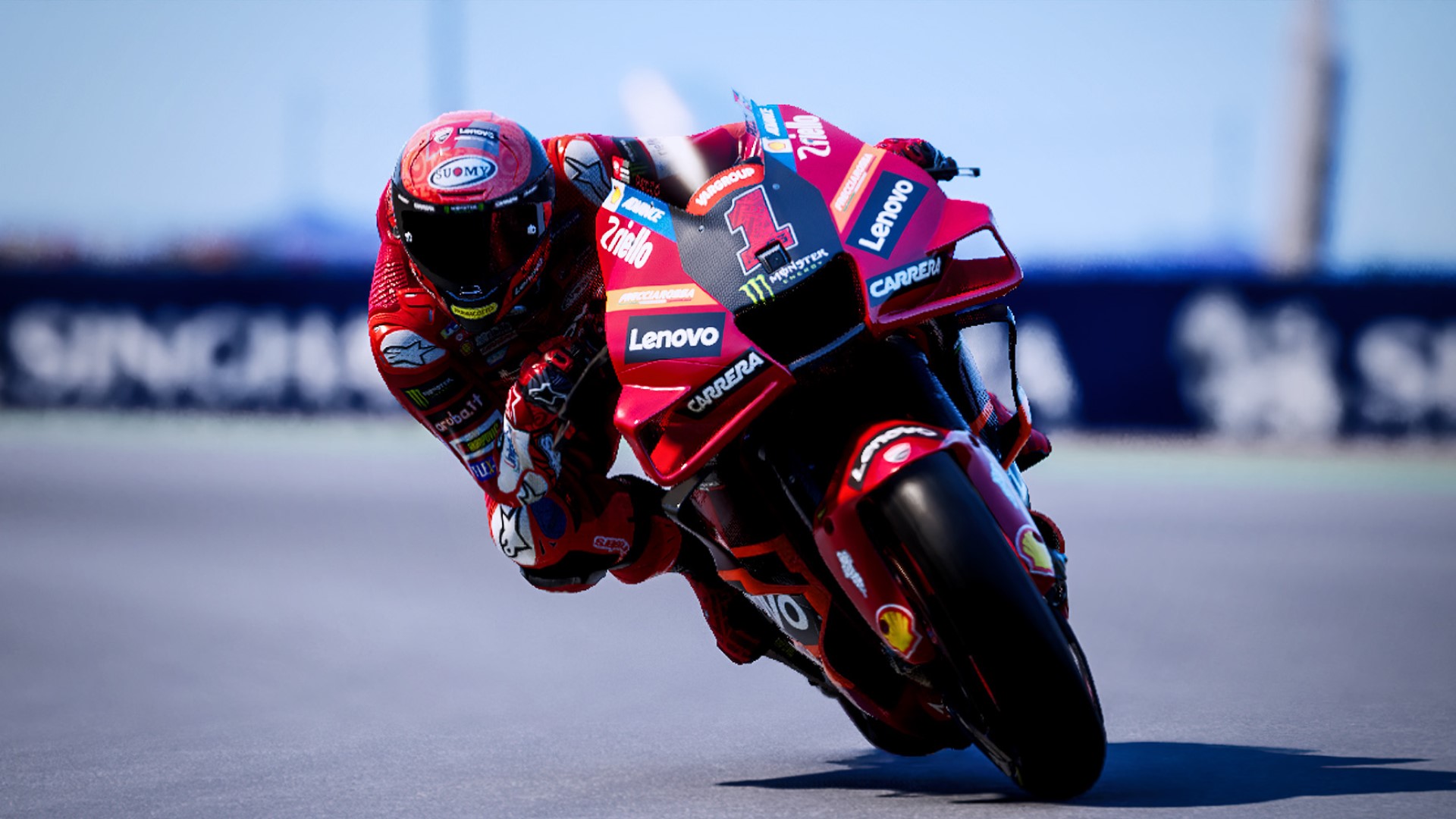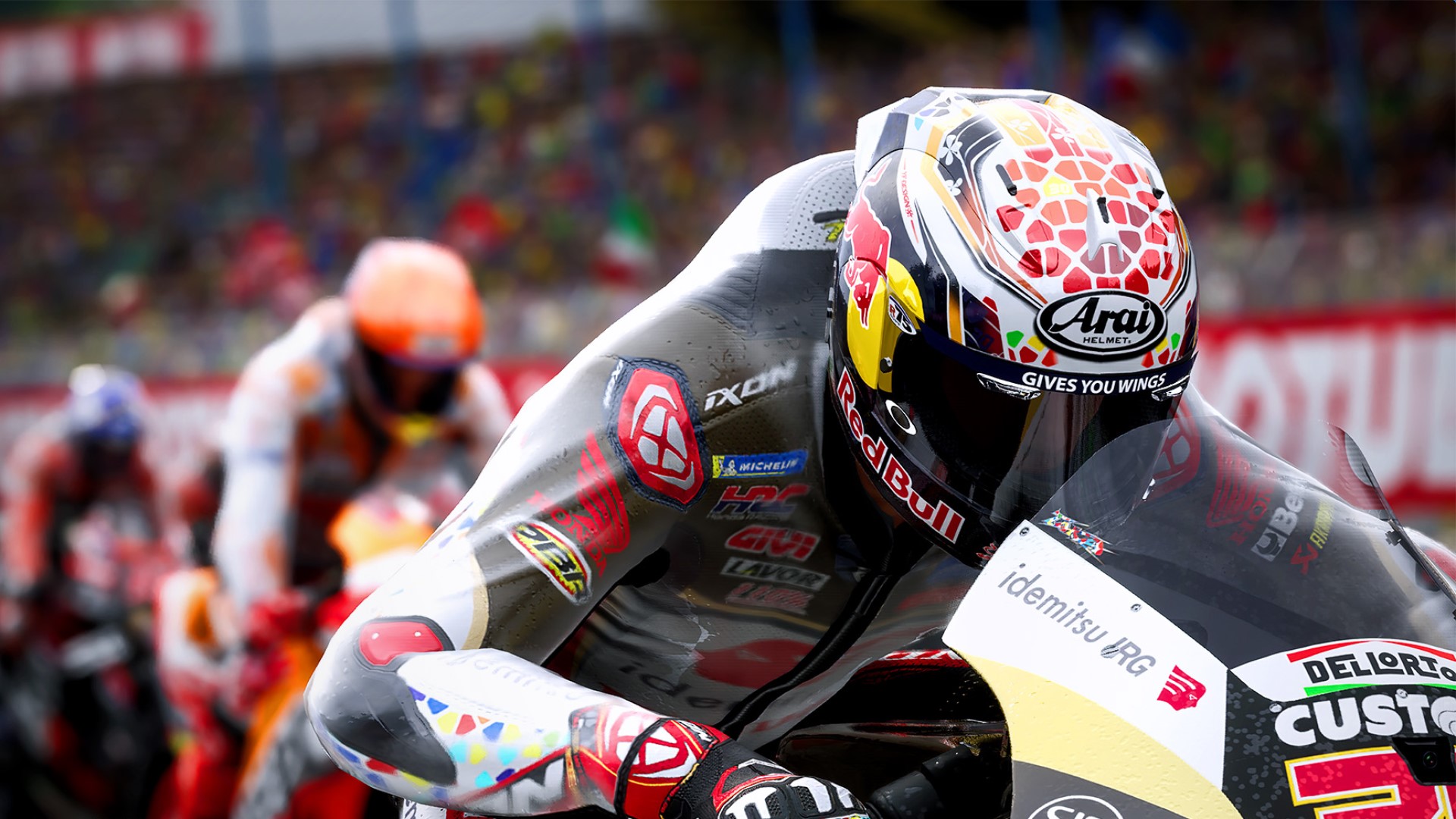Think you’re a decent sim racer? Try staying on the bike for one lap in MotoGP 23
Milestone’s fearsomely rigorous simulation of motorcycle racing pulls absolutely zero punches

That’s not hyperbole, either. I’ve been playing Milestone’s MotoGP series for a decade now and it took me hours - several sweaty, profane hours - before I could get around the track just once cleanly in MotoGP 23.
While some of the best racing games and sims are unilaterally difficult whatever you do with the assists - Dirt Rally 2’s ears are burning right now - Milestone’s latest licensed MotoGP release can actually be quite forgiving if you want it to be. The assists have had an overhaul, which means last year’s painfully heavy-handed auto-braking is gone, and a new neural aid system stands in its place. These throttle, braking, and steering aids analyse your inputs and step in when needed, which means the sensation of a computer taking over and riding the bike for you is greatly reduced. And while the neural AI powering it is probably just using it as training for the great uprising in about five years’ time, for now, it means you’ve got a pretty customisable difficulty curve available to you.
So then, why it took me so long to get a clean lap in: it’s because I didn’t want to use the assists. Not out of sheer bloody-mindedness or pride, but because the handling model in this year’s game is absolutely extraordinary. It feels exactly the way your brain hopes and imagines riding a MotoGP prototype using a gamepad would feel, and that means I wanted to enjoy the full sensation of it, learn all the details, and eventually master it.
Which is the whole point in any racing sim, right? We don’t just play them because we love adjusting suspension stiffness or seeing a minus symbol on our current lap delta. Although obviously both those things are fantastic. We put in the laps and train our muscle memory because we want to develop a specific skill. And the closer the skill we’re honing feels to the real-world discipline, the more fun it is.
Trigger happy

In four-wheeled sim racing, those steering and pedal inputs are obviously very transferable to a real vehicle. GT Academy winner and decorated pro driver Jann Mardenborough is testament to that, and the upcoming Gran Turismo movie will make that point to the masses.
But it’s different in motorcycle racing. There are no affordable $500 bike racing sim rigs that you can plug in and race with. There are hydraulic simulators that use real bikes, but they’re prohibitively expensive and even they can’t capture even the fundamental elements of riding a bike in motion - when you’re leaning into a corner, you’re looking way off at the corner exit, and a screen placed in front of your bike doesn’t let you do that.
It’s this subtlety of control that MotoGP 23 demands of you that really stands out.
So while four-wheeled sim racing takes place in a very closely related environment to the real thing, for motorcycle sims a gamepad is the agreed platform. That means a developer like Milestone needs to approach the idea of simulating the bike a little differently.
Get daily insight, inspiration and deals in your inbox
Sign up for breaking news, reviews, opinion, top tech deals, and more.
Until this landmark release, it meant massively simplifying things. For most of the time I’ve been playing bike racers, I’ve been braking using a single input. Back on the venerable 1999 PC game GP500, it was the Z key. In Milestone’s Superbike World Championship ‘99, it was the down arrow. It wasn’t until the Milanese studio regained the MotoGP franchise rights in 2013 and started iterating yearly that we learned to brake with the front and rear inputs separately.

And braking’s still an absolute heart attack of an endeavour in this game; 200+ metres of squirming, tire smoke, and sobbing before every corner. But series fans are used to that now. What really stands out is what happens when you get back on the throttle.
Again, it was once all so simple: hitting the up arrow, or the A key, or the right trigger, made you go faster. Sometimes if you did it too quickly you’d pull a wheelie. But what MotoGP 23 captures is that when you apply power at a lean angle, the bike really wants to stand itself back up.
And that totally changes the experience of riding. It gets you thinking about your rider’s position on the bike in much more detail, feathering both the throttle and the left stick until you reckon you’re lined up enough to gun it down the next straight without spilling over the exit apex. In other words: you’re basically almost always applying some lean, one way or the other.
And it’s this subtlety of control that MotoGP 23 demands of you that really stands out. Even among the very best racing sims, the rarefied air Assetto Corsa Competizione and Automobilista occupy, this compares very well. With those neural aids disabled and the full power and volatility of a 1000cc motorcycle underneath you, you’re having to consider exact braking force on two separate brake discs, do mental equations about lean angle versus throttle level, and guide your rider around his vehicle in reaction to every wobble and vibration through every turn. It’s incredibly intense.

Risking it all
And what’s especially impressive about this is that MotoGP’s a licensed, annualised series. This isn’t a niche one-off with a multi-year dev cycle. It carries the approval of MotoGP’s rights holder, Dorna. It’s intended, therefore, to hit a pretty big market.
We’ve become used to licensed sports and racing series like this taking absolutely zero risks. Tweaking minor features from one release to the next, keeping the appeal as broad as possible, shifting units primarily off the back of the fact they have this season’s updated cars, bikes, jerseys, or athletes. It’s true of FIFA, NBA 2K, and F1 alike - they’re not big risk-takers.
I don’t want to do MotoGP 23 a disservice - it is accessible. Those neural aids are actually very good, and on their strongest setting they’ll let an absolute novice to racing games as a genre get around the track and have a decent time. The point is that they’ve spent an incredible amount of time and expertise building something that the really dedicated players will enjoy: an absolutely formidable handling experience with all the assists off. And that needs to be celebrated.
So if you’re strictly a four-wheeled sim racer who never sated their curiosity for bike racing before, this is the moment. MotoGP 23 deserves your attention - your racing wheel and sim rig will still be there waiting for you after you take a little two-wheeler holiday.
MotoGP 23 is out now on PS5, PS4, Xbox Series X|S, Xbox One, Nintendo Switch, and PC.